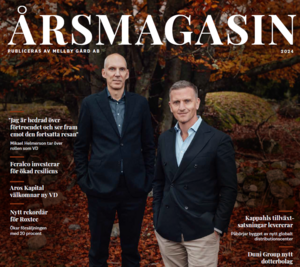
Sustainability
Long-term, responsible and active ownership are the cornerstones of Mellby Gård’s investment philosophy. With a sharper focus on sustainability in all business activities, this philosophy is more relevant than ever. The Mellby Gård Group is now ready to step up its sustainability efforts and generate even more positive change.
Mellby Gård's sustainability commitment is divided into three levels. The work that takes place in the parent company Mellby Gård AB, the sustainability work conducted in all companies in the Mellby Gård Group and finally the way in which new investments are valued. All the work is based on Mellby Gård’s ownership philosophy – the Mellby model – which focuses on long-term, responsible and active ownership. This is combined with a strong social commitment.
Sustainability efforts in our operations
For Mellby Gård, sustainability in a broader perspective is about contributing to addressing significant societal challenges. We see a substantial shift in the business world and the expectations placed on us as a group. It is no longer sufficient to merely answer the question of “what” in relation to your business but also to address “how” and “why.” In this regard, we stand firm in the Mellby model, which provides us with clear direction and purpose in what we do, enabling us to contribute to positive change for the environment and society.
To meet legal requirements and heightened expectations, a unified approach to sustainability was established across the Mellby Gård Group in 2024. This aligns with the EU’s new Corporate Sustainability Reporting Directive (CSRD), which requires Mellby Gård to report as the parent company starting from the 2025 financial year.
The common framework for sustainability efforts is based on the group’s double materiality analysis and includes a range of shared key performance indicators (KPIs). These will be reflected in the group’s sustainability reporting, starting in spring 2026.
Evaluating sustainability in new investments
Sustainability is becoming an increasingly important factor when Mellby Gård evaluates companies for investment. In line with the Mellby model’s focus on long-term perspectives, sustainability - and incorporating sustainability into the business model - is about identifying companies with enduring relevance over time.
Sustainability is therefore a key aspect when we assess new investments. We see great potential in companies that have a strong, positive impact on society and the environment through their operations. A sustainable business concept is simply more attractive to us as it signals the company’s ability to thrive over time and attract customers, talent, and capital.
A decentralized approach to sustainability
Today, the Mellby Gård Group comprises 15 companies across various industries. Naturally, this means the companies face different demands and have varying levels of maturity in their sustainability efforts. Mellby Gård has always taken a supportive role, encouraging companies that aim to lead the way while also acting as a sounding board for those requiring additional guidance.
Now, a clear shift is taking place regarding sustainability, particularly in connection with upcoming EU legislation. As the parent company of the group, there is an expectation to take on a more coordinated role in the sustainability efforts across all subsidiaries. This primarily pertains to sustainability reporting, which will be integrated with the group’s financial reporting. However, the efforts and initiatives to achieve the group’s sustainability goals will continue to be implemented by the companies themselves, as they are the experts in their respective industries and understand which actions will have the greatest impact.
A major social commitment
Mellby Gård's sustainability work also includes the company's extensive social commitment, where they provide financial support to a number of people and organizations that work on one of Mellby Gård's core issues. You can read more about these issues and initiatives here.



